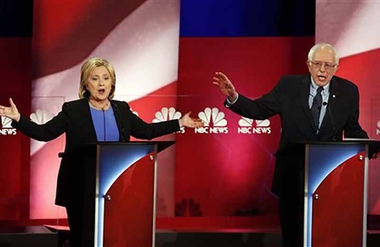Clinton faces challenge in Iowa caucus reminiscent of 2008

WASHINGTON (AP) — Recall this 2008 storyline: Hillary Clinton enters the presidential campaign as the Democratic front-runner, runs into an inspirational candidate who generates big crowds and enthusiasm. And she winds up in a dogfight in Iowa.
Sound familiar? With 10 days left before Iowa's lead-off caucuses, Clinton finds herself in a heated contest against insurgent rival Bernie Sanders reminiscent of her 2008 face-off with then-Sen. Barack Obama.
The Vermont senator has soared to a nip-and-tuck race in Iowa and holds an advantage in New Hampshire, putting Clinton back on the brink in her second presidential bid.
Clinton lost Iowa in 2008, a setback that she never fully recovered from against Obama, who went on to win the White House. This time she hopes a larger field organization in Iowa and an escalation of her critiques of Sanders' record and message might undercut his momentum.
Yet there may be a silver lining for Clinton's 2016 campaign: Unlike Obama, Sanders is a self-described "democratic socialist" and has done little to expand his support beyond white liberal voters who populate the first two presidential contests.
Clinton has locked down nearly all of the establishment support — governors, members of Congress and Democratic leaders — who can help her in a lengthy primary.
And, for now, the former secretary of state has an advantage in a series of Southern-heavy primaries and caucuses after Iowa and New Hampshire. The question is whether that edge vanishes if Sanders defeats Clinton in the first two contests, a distinct possibility.
"Bernie's appeal is powerful and it resonates with a certain lane of the Democratic electorate for sure, young voters, independent voters," said Steve McMahon, a Democratic strategist who advised Howard Dean's 2004 presidential campaign.
"But it's ultimately not a winning general election message, it's a protest message. It's difficult to see it grow to the point it becomes a real threat to Secretary Clinton's campaign."
Clinton led in Iowa throughout the fall and into December but polls released this month have depicted a much tighter race against Sanders. At campaign stops, Clinton has ramped up her criticism of Sanders, questioning the practicality of his agenda to provide universal health care, his voting record on gun control and his foreign policy credentials.
Her campaign has seized upon Sanders' suggestions that the U.S. should normalize relations with Iran, saying it makes him an outlier compared with Obama and Clinton.
Driving the foreign policy message, Clinton released a new ad on Friday, in which the narrator says, "She's the one leader who has what it takes to get every part of the job done."
Though less provocative, it offers parallels to Clinton's "3 a.m." ad against Obama, which asked voters who they would want to answer the early morning phone call to respond to a global challenge.
Sanders, like Obama, has sought to offer a more uplifting, aspirational message. His latest ad, "America," shows off his massive rallies and a genial image of the 74-year-old lawmaker to the tune of the famous 1968 song by Simon and Garfunkel.
It presents a window into how Sanders has tapped into a key part of the Obama coalition: white liberal voters and young voters. Both were critical in Obama's Iowa victory in 2008 and will be counted upon heavily, along with independent voters who can register for the Democratic caucuses if they choose.
But one major question entering Iowa is whether there will be enough of these voters. In 2008, Obama fueled a massive turnout in Iowa — about 240,000 people participated, compared to about 125,000 in 2004 — and few expect crowds anywhere near that 2008 size.
"I think Bernie is more of a Howard Dean than a Barack Obama," said Buffy Wicks, a veteran of the Dean and Obama campaigns.
Betsy Burton, 71, an independent voter in New Hampshire, says she sees a parallel between Obama's successful run in 2008 and Sanders' quest this year for the Democratic nomination, saying she senses that Sanders instills the same level of excitement that Obama generated eight years ago.
"I think a lot of people are thrilled that he's catching on and what he's saying is so contagious," said Burton. "I think he could follow the same path as Obama in 2008."
The 2008 Democratic field included eight major candidates, driving up turnout. Other than Clinton and Sanders, former Maryland Gov. Martin O'Malley is the only other major Democratic candidate.
While Obama had several key surrogates in 2008, including Virginia Gov. Tim Kaine and Missouri Sen. Claire McCaskill along with top Iowa Democrats, Clinton has swept up every major endorsement to date (Massachusetts Sen. Elizabeth Warren is neutral for now).
In New Hampshire, Clinton was introduced Friday by the state's popular Sen. Jeanne Shaheen, a former governor, and her firepower will be on display this weekend in Iowa, with Senate Democrats like Kaine, Cory Booker of New Jersey and Kirsten Gillibrand of New York rallying supporters on her behalf.
By Lisa Lerer and Ken Thomas, AP. Copyright 2016 The Associated Press. All rights reserved. This material may not be published, broadcast, rewritten or redistributed.
The Gayly - 1/22/2016 @ 4:35 p.m. CST





